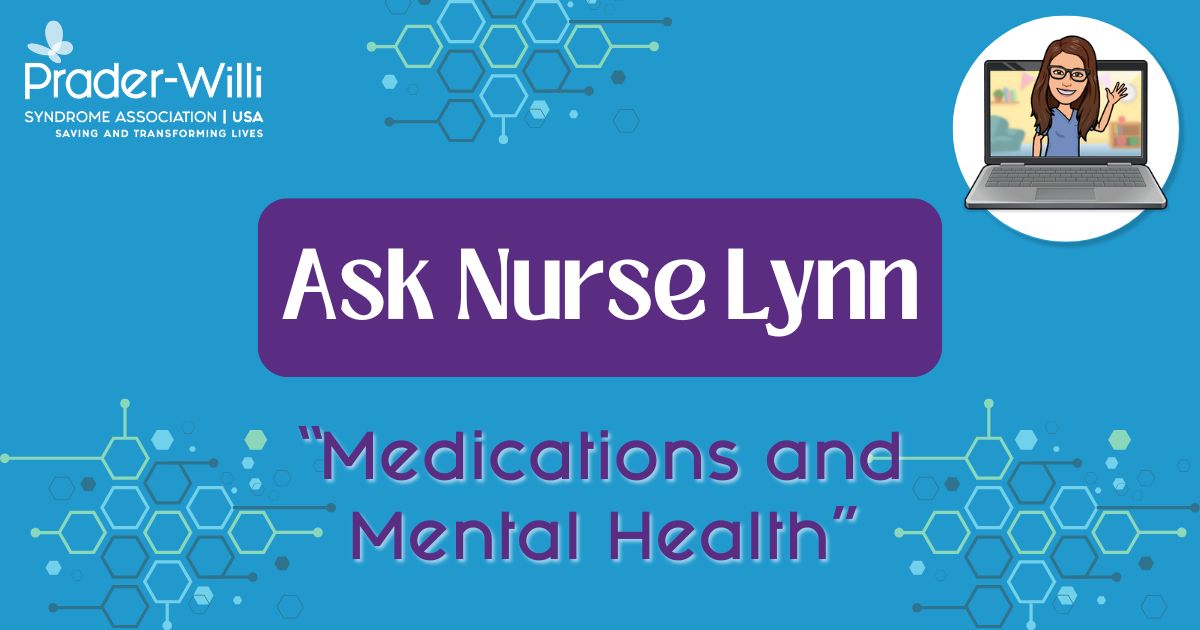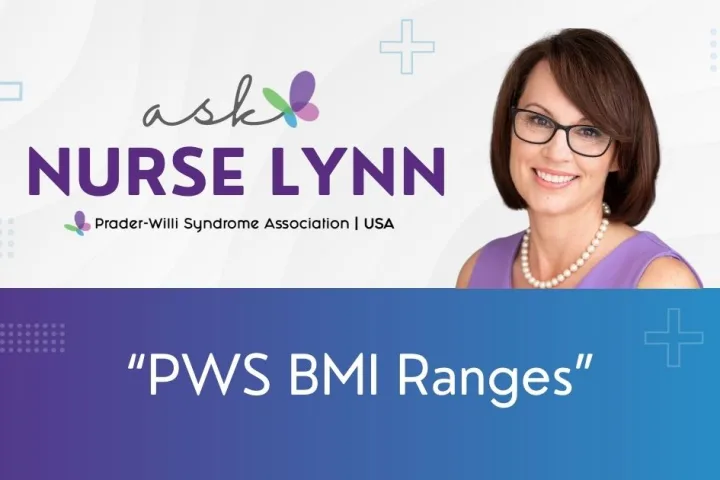Question:
Male, 35 years old, Deletion subtype
My son has been on the same meds for 25 years through the PWS institute in PA years ago: Trileptal 300mg x 2 a day and lithium 150mg x 2 a day. About a year ago he started having more aggression and more outbursts, so his doctor started him on low dose of risperidone. His picking and behaviors continued to escalate, and he put him on sertilne and added a time release Xanax. That didn’t seem to help as his picking, weight gain, and behaviors continued to be more and more unmanageable. Then he switched him to clomioramine – started at 75 the 100 then 125 maybe. Anyway, he has had two very serious episodes and hit and went crazy like never before. He went to hospital for the second time, and they removed all the meds except the original meds of lithium and trileptal. It’s taken a few, we are still withdrawing.
Nurse Lynn’s Response:
It is heartbreaking that your son had to navigate such a challenging mental health journey, experiencing multiple medications and hospitalizations in a short time. Unfortunately, this is not uncommon for many families dealing with Prader-Willi syndrome (PWS), highlighting the need for clinicians well-versed in its complexities.
Clinicians often hesitate to make multiple medication changes simultaneously, as it complicates identifying what works. Individual responses to medications vary significantly, and certain classes may be more effective for specific individuals.
I’d like to mention GeneSight, one of several pharmacogenomic test covered by many insurance companies. This test assesses specific genes involved in drug metabolism and efficacy, helping clinicians decide which medications may work best for a patient and which may cause adverse effects. This test typically involves a simple cheek swab or saliva sample.
At PWSA | USA, we offer a peer-to-peer consultation service. One of our physician experts can collaborate with your son’s treating physician to provide tailored treatment suggestions. Please reach out if this sounds like a possibility for your son.
I will also attach the PWS Information for Psychiatrists handout developed by Drs.Forster and Gourash, which provides valuable insights into the psychiatric complexities of PWS.
Resource:
PWS-Information-for-Psychiatrists.pdf
Do you have a question for Nurse Lynn? Submit your question here:
Share this!





 Perry A. Zirkel has written more than 1,500 publications on various aspects of school law, with an emphasis on legal issues in special education. He writes a regular column for NAESP’s Principal magazine and NASP’s Communiqué newsletter, and he did so previously for Phi Delta Kappan and Teaching Exceptional Children.
Perry A. Zirkel has written more than 1,500 publications on various aspects of school law, with an emphasis on legal issues in special education. He writes a regular column for NAESP’s Principal magazine and NASP’s Communiqué newsletter, and he did so previously for Phi Delta Kappan and Teaching Exceptional Children. Jennifer Bolander has been serving as a Special Education Specialist for PWSA (USA) since October of 2015. She is a graduate of John Carroll University and lives in Ohio with her husband Brad and daughters Kate (17), and Sophia (13) who was born with PWS.
Jennifer Bolander has been serving as a Special Education Specialist for PWSA (USA) since October of 2015. She is a graduate of John Carroll University and lives in Ohio with her husband Brad and daughters Kate (17), and Sophia (13) who was born with PWS. Dr. Amy McTighe is the PWS Program Manager and Inpatient Teacher at the Center for Prader-Willi Syndrome at the Children’s Institute of Pittsburgh. She graduated from Duquesne University receiving her Bachelor’s and Master’s degree in Education with a focus on elementary education, special education, and language arts.
Dr. Amy McTighe is the PWS Program Manager and Inpatient Teacher at the Center for Prader-Willi Syndrome at the Children’s Institute of Pittsburgh. She graduated from Duquesne University receiving her Bachelor’s and Master’s degree in Education with a focus on elementary education, special education, and language arts. Evan has worked with the Prader-Willi Syndrome Association (USA) since 2007 primarily as a Crisis Intervention and Family Support Counselor. Evans works with parents and schools to foster strong collaborative relationships and appropriate educational environments for students with PWS.
Evan has worked with the Prader-Willi Syndrome Association (USA) since 2007 primarily as a Crisis Intervention and Family Support Counselor. Evans works with parents and schools to foster strong collaborative relationships and appropriate educational environments for students with PWS. Staci Zimmerman works for Prader-Willi Syndrome Association of Colorado as an Individualized Education Program (IEP) consultant. Staci collaborates with the PWS multi-disciplinary clinic at the Children’s Hospital in Denver supporting families and school districts around the United States with their child’s Individual Educational Plan.
Staci Zimmerman works for Prader-Willi Syndrome Association of Colorado as an Individualized Education Program (IEP) consultant. Staci collaborates with the PWS multi-disciplinary clinic at the Children’s Hospital in Denver supporting families and school districts around the United States with their child’s Individual Educational Plan. Founded in 2001, SDLC is a non-profit legal services organization dedicated to protecting and advancing the legal rights of people with disabilities throughout the South. It partners with the Southern Poverty Law Center, Protection and Advocacy (P&A) programs, Legal Services Corporations (LSC) and disability organizations on major, systemic disability rights issues involving the Individuals with Disabilities Education Act (IDEA), Americans with Disabilities Act (ADA), and the federal Medicaid Act. Recently in November 2014, Jim retired.
Founded in 2001, SDLC is a non-profit legal services organization dedicated to protecting and advancing the legal rights of people with disabilities throughout the South. It partners with the Southern Poverty Law Center, Protection and Advocacy (P&A) programs, Legal Services Corporations (LSC) and disability organizations on major, systemic disability rights issues involving the Individuals with Disabilities Education Act (IDEA), Americans with Disabilities Act (ADA), and the federal Medicaid Act. Recently in November 2014, Jim retired.